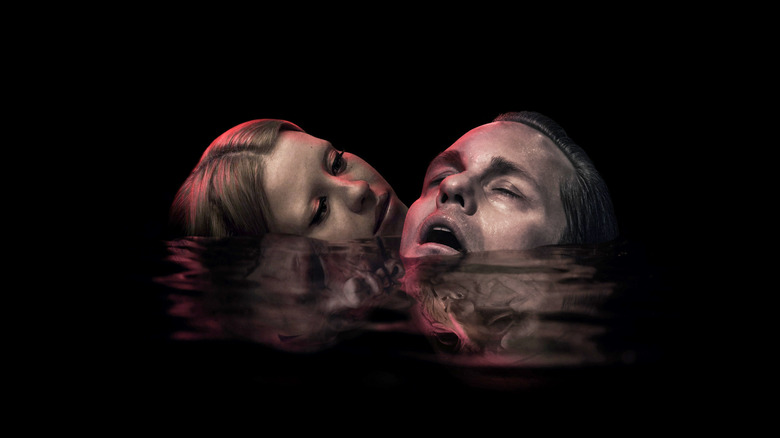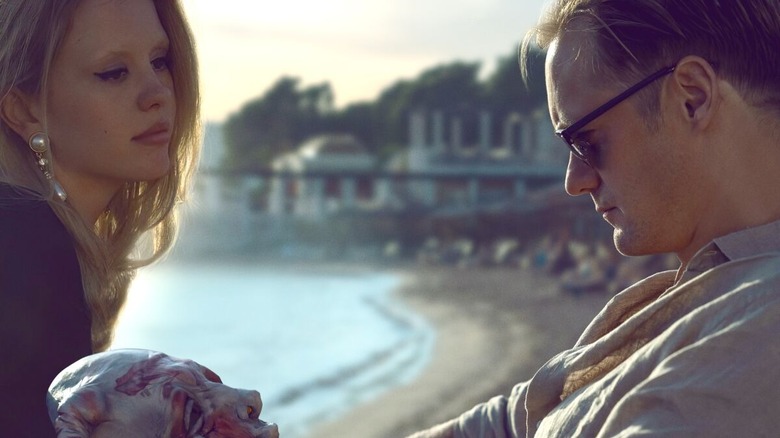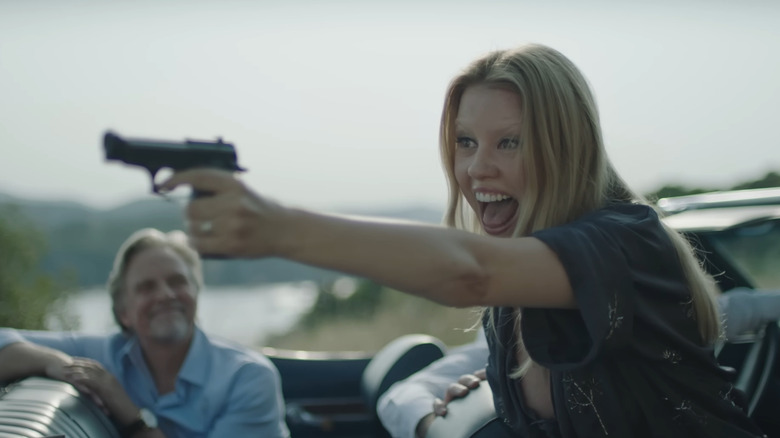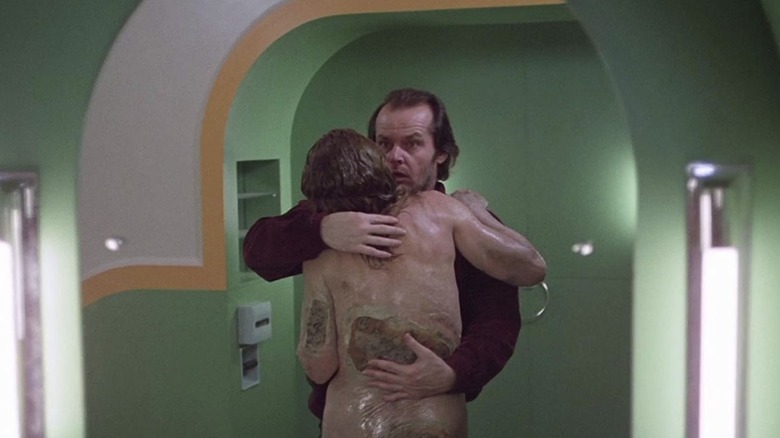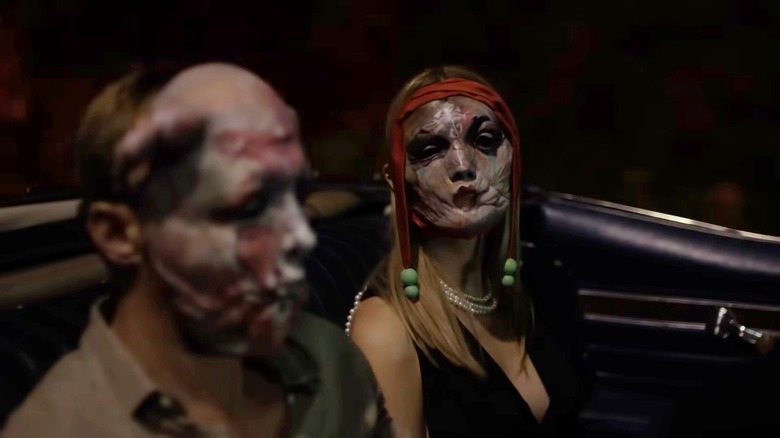How Infinity Pool Channels A Stanley Kubrick Classic
This article contains major spoilers for "Infinity Pool."
The inflation of ego can provide you with a one-way ticket to your own self destruction — but what if there was nothing there to demolish? In each of his three films, director Brandon Cronenberg has demonstrated that his interest lies in alternate worlds where accessibility to harrowing technology brings about the death of the self. "Antiviral" offered the taste of sterilized disease from your favorite celebrity for a price, while "Possessor" offers the chance of removing a stranger's bodily autonomy in favor of carrying out assassinations.
In his third feature, "Infinity Pool," Cronenberg builds upon this by presenting a world in which the obscenely wealthy can bypass the consequences for their actions by simply making a payment that allows a clone of themselves to take the rap instead. With that option made available to them, they don't fear facing repercussions, which helps them to lure in more of their ilk. The unlucky soul that falls into this spiral of vacation debauchery is James Foster (Alexander Skarsgård), a novelist who decides to take a vacation to a luxurious resort in the fictional country of Li Tolqa with his wife Em (Cleopatra Coleman).
What follows is a depraved and darkly hilarious satire that sees Skarsgård slowly transform into a grotesque beast on account of the people he surrounds himself with. Having stumbled onto a bad case of writer's block, his character uses this golden opportunity to take it out on everyone else. There are a number of influences that could be read into Cronenberg's hallucinatory horror parable, but there's one in particular that's been scratching my brain.
All play and no work makes James a bad boy
In Stanley's Kubrick's adaptation of "The Shining," writer Jack Torrance (Jack Nicholson) travels with his family to the isolated Overlook Hotel to work as a caretaker during its dormant winter months. While "Infinity Pool" doesn't quite share the same story, there's a noticeable thematic tie between the journey of its two lead characters. Jack is a writer who seems a bit unsteady, but his wife Wendy (Shelley Duvall) assures people that he's changed his last violent incident. The corrupting influence of the hotel, however, causes him to lose his grip on reality, and in turn, he uses his frustration to sadistically hurt people.
When we meet James in "Infinity Pool," he's similarly hampered by his inability to put a sentence to paper. We never see how he acts back home. He has access to money, but it doesn't buy him the critical acclaim he hoped for when it came to writing his first book. That's why he immediately shows interest in Gabi (Mia Goth), a commercial actress staying at the resort with her husband Alban (Jalil Lespert). She grabs his attention through complimenting his novel, as it appears that no one else has.
There's a fascinating divide between the two, as Jack has access to a resort where he's solely responsible for keeping it running, while James' vacation spot allows him to basically do whatever he wants. In "Infinity Pool," the two couples venture outside of the resort compound for a joyride, and in the process, murder an innocent local farmer in a drunk driving accident. That's what leads James to witness the grotesque death penalty alternative. Given that the doubles are exactly alike, physically and emotionally, it's horrifying to see them executed. It's here though that we see what kind of collective monster this process breeds.
Getting in with a bad crowd
The rich folk of "Infinity Pool" have formed their own little murder club; each of them have had their own doubles executed for some sort of crime committed on Li Tolqa soil. This group likes to spend their vacation tormeting as many people as they possibly can, and James is welcomed with open arms and weapons at the ready. There's a darkly comic scene where we think that they're finally about to get their comeuppance via group execution, but the camera pans up to show that the originals are up in the bleachers like they're watching a play.
What reason do they have to adhere to the rules of Li Tolqa when they've seen that, no matter what heinous acts of violence they commit, their wallets can always shield them from the consequences?
Similarly, as the Overlook Hotel swallows Jack Torrance, the ghostly inhabitants whisper sweet nothings into his ear. They present him with gifts that bring out the worst in him, all in the name of coercing their pawn into committing terrible acts. Lloyd the Bartender (Joe Turkel) pours the former alcoholic a drink, and Jack treats him better than his actual family. As he loses his own grasp on reality, the Overlook phantoms exploit a fragile man to act out his worst impulses.
Family estrangement
In "The Shining," Jack is allured by the beautiful woman awaiting him in Room 237. She represents everything that he desires, yet he quickly comes to realize that she's merely a mirage covering something much uglier. The Overlook plays mind games as she becomes a decomposing corpse that laughs in his face. It's a corrupted temptation that is mirrored in "Infinity Pool." As James transforms into one of the diseased elite, Gabi represents the gateway to unleashing his dark desires.
During his double's execution, James watches with Em by his side. Where she's naturally horrified by the scared panicked noises that sound as though they were coming from her husband, James watches with a sickening delight. He feels something in him come alive in that moment, which disgusts Em, who can hardly stand to look at him. By the time James comes back to the hotel room with his second urn, Em is already prepared to leave the resort without him. But with Gabi waiting for him, James couldn't care less about losing that connection; like Jack Torrance turning on his own family to please the Overlook ghosts, temptation has blinded him to the value of what he already has.
Eternal exile in Paradise Hell
James only starts to sober up when the sadistic group of rich tourists trick him into beating up a version of himself that they were able to have commissioned. He tries to escape the country quickly thereafter, but Gabi prevents that from happening. She won't let him leave until James carries out one final kill, which he does. That's truly his point of no return.
Yet unlike Jack, James demonstrates awareness of what he has become. He sees the monsters stepping back into the disguise of human skin, and doesn't want to spread the disease any further back home. In the final moments of "Infinity Pool," James sits on a beach chair as the waves come crashing in. We learn earlier on that the resort is set to close for the year on account of the monsoon season, so it's safe to assume he'll be swallowed by the oncoming storm.
James killed a literal extension of himself by bashing his face in. And while Jack Torrance doesn't succeed in killing his son at the end of "The Shining," simply by attempting to kill that extension of himself he seals his fate as an permanent guest of the Overlook Hotel. Both characters have molded themselves into monsters that, both metaphorically and physically, can never leave their isolated paradise.
"Infinity Pool" is now playing in theaters nationwide.
